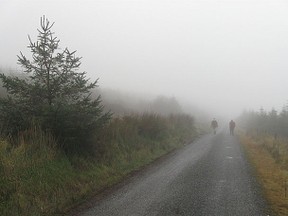 A well-known Wiccan high priestess lives in County Meath now, but she used to live in Mayo.
A well-known Wiccan high priestess lives in County Meath now, but she used to live in Mayo.
She confirmed to me that the hungry ghosts are heard about in stories told in her present location. But it was back in Mayo, where she'd encountered them herself.
The main roads into Western Ireland all pass through seemingly endless miles of bog land. It can be stunningly beautiful, but not so much late at night, when all you want is to be home.
The priestess and her late husband were driving through it, chatting about their day to stave off boredom and to keep themselves awake. It didn't help that the weather was against them. Driving conditions were hazardous enough without that extreme concentration.
Suddenly her husband glimpsed a woman standing at the side of the road. It had been a mere flash, unseen until they were actually passing her.
This was the middle of nowhere, in the early hours of the morning, with rain lashing down. He second guessed his own sight, twisting for a double-take. There was no sign of her in the rear view mirror. Nevertheless, they had to reverse to check. She wasn't there.
By now, their sensibilities tingled with a feeling that they weren't alone. It wasn't a nice sensation. The atmosphere felt laden with desperation and despair. Debating pareidolia versus an actual ghost sighting, this feeling gave credence to the latter. What was to happen next confirmed it all.
"They were everywhere!" The priestess told me, several years later. "In families, alone, some of them not even able to hold their form. They were all around the car!"
Her husband had battled the instinct to close his eyes, as he had to keep on driving. Going around them was not an option, so they drove on through.
But this was no hit and run massacre. The people they were seeing had been dead a long time. Starved and trudging, these were the famine victims forced to leave their homes. They hadn't made it past this narrow country lane over a hundred and fifty years before.
The experience shook the couple, but somehow it seemed worse when they'd finally passed through. Now the darkness seemed watchful, menacing and with the threat that something terrible could step out at any time.
It was a very long journey back to their Mayo home.


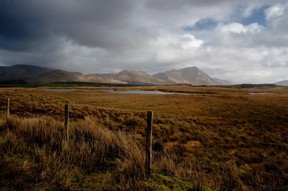 There's no-one like the Irish for telling ghost stories. Or, for that matter, any tale at all.
There's no-one like the Irish for telling ghost stories. Or, for that matter, any tale at all. 


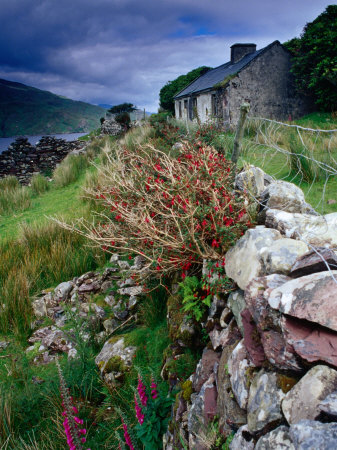
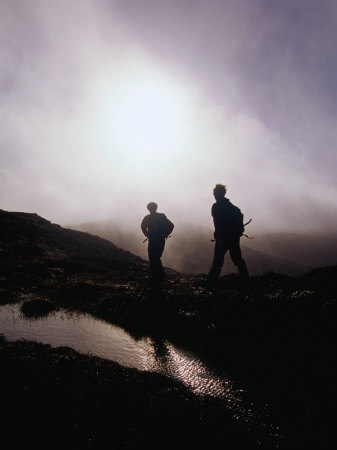



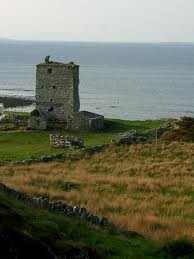 All of the locals knew about the cursed area south of the town, but it wasn't something that was told to the tourists.
All of the locals knew about the cursed area south of the town, but it wasn't something that was told to the tourists.


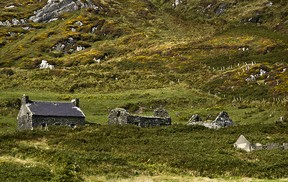 "They're not called the Hungry Fields," The lady from Cork told me, "It's the Hungry Grass, if we're going straight from the Gaelic." She nodded grimly, as she moved about her kitchen making us both a nice cup of tea. "But sure, it's real enough."
"They're not called the Hungry Fields," The lady from Cork told me, "It's the Hungry Grass, if we're going straight from the Gaelic." She nodded grimly, as she moved about her kitchen making us both a nice cup of tea. "But sure, it's real enough."



 A well-known Wiccan high priestess lives in County Meath now, but she used to live in Mayo.
A well-known Wiccan high priestess lives in County Meath now, but she used to live in Mayo.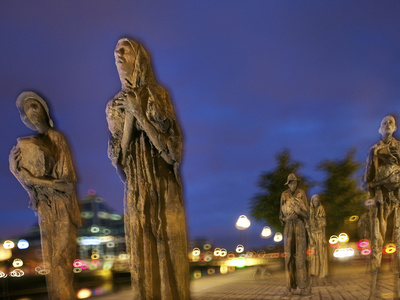
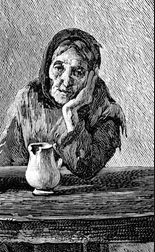 This article prompted Wizzley Author
This article prompted Wizzley Author 



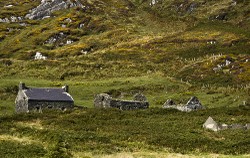

 St Tydecho's Churches in West Waleson 09/03/2014
St Tydecho's Churches in West Waleson 09/03/2014
 Goodies for an Outlander Premiere Partyon 03/06/2015
Goodies for an Outlander Premiere Partyon 03/06/2015
 Holocaust Memorial Day Interview with Rainer Höss, Grandson of Rudolf Architect of Auschwitzon 01/24/2015
Holocaust Memorial Day Interview with Rainer Höss, Grandson of Rudolf Architect of Auschwitzon 01/24/2015
 Romantic Valentine Gifts for an Outlander Fanon 01/16/2015
Romantic Valentine Gifts for an Outlander Fanon 01/16/2015

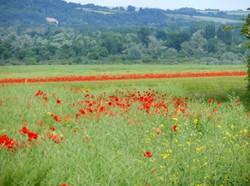

What do you think about it all?
Another point. Ireland is either in your soul, or you run from it, and some folk cannot get to the ferry fast enough. If it is in your soul, as it is in mine, you may hate the fact or celebrate it. The choice is yours. Veronica and I accept our Irish heritage and run with it. Let's face it. Ireland is our spiritual home.
A vital point: Connemara is geologically complex. There is none of the limestone that there is in the Burren, but it is old, hard rock from the pre-Cambrian period, that's why it is so rough and difficult to handle.
Ancestors from Galway! That's a surprise,my father's grandmothers were from Galway as well, and one was from Connemara, which accounts for her poteen brewing, but as she has been dead many years, the authorities cannot touch her! I take alcohol, would you believe it, and I am quite proud of the old girl for her brewing exploits. My great grandfather, who was from Limerick, claimed to have heard the Banshee, but as it cannot cross water I suspect that either he was drunk or it was a baying hound.
As for ghosts, pookas, banshees, my great grandfather, John Manning, claimed to have heard the banshee, but as it cannot cross water I think him drunk at the time. But there are more things in heaven and earth than are dreamed of in conventional philosophy. Be aware that the conventional world view is entirely wrong and misguided. As someone who has encountered strange things, I am quite open minded.
Both of my dad's grandmothers were from Galway, indeed one was from Connemara itself. They were full of tales of bean-si (banshee ) pookas, sidheags ( she-ogs ). When I visited Galway last summer there was plenty talk of Irish ghosts, fairies and spirits. Connemara was also a main area of illegal poteen brewing.
Galway especially Connemara is boggy, misty, foreboding, majestic and having visited, it's easy to see how these myths arise. The natural stone is a unique form of limestone and Galway possesses a very ethereal limestone pavement, The Burren. I do believe that large masses of natural stone have their own electricity which can replay or throw up images of past great emotion. I also believe in inherited memory. Galway is ripe for this type of thing historically and geographically.
On a personal level, with all respect to everyone's beliefs, I do not believe in any form of bain-si, sidheags, pookas, ghosts or anything. I believe it would be possible to lose one's way on those moors in West Connemara. They are terrifying. I am nearly 60% Irish. I have worked in Tudor manors, Victorian museums etc and I have never experienced anything at all, in England or Ireland. I do believe respectfully that those who tell these stories do so in all sincerity.
Everyone who's told me their story first hand seemed very genuine about it.
A great tale. And no doubt some truth to it all!
Thank you very much, Frank. I've now added it to the end. Please let me know if you want anything there changing.
I'll have to look out for the book. Thanks!
I do not mind that you add it to the article. There were two of the witnesses, both students for the Catholic priesthood. One, John, was a tough-minded no-nonsense sort of guy who dismissed ghosts until that day. The other,Mike, was a quieter, more intellectual Dublin lad.
My blood, as you know, is half Irish, and all of the Irish half is West.
I have a book: Connemara: legend and Landscape, by Hugh McIlveen. I got it at the Manchester Irish festival, but it might be available on Amazon. It is worth buying. There are good pictures in it.
I've never been to the west of Ireland, but it's most definitely on my bucket list. I'm 98% certain that I have genealogy in Antrim; and there's a possibility of Galway too, though the latter is much more tenuous.
Connemara sounds amazing. You're making me want to go there right now.
And wow! Re: Your story about your friend. Do you mind if I add that to the main article?
Connemara is something special, a strange, ancient land of rock,bog and lake that stands out from the distance as a majestic view. I have some ancestors from there, but no living relatives. Those who have lived in the West of Ireland, as I did for a year, either fall for her enchantments and yearn to return, or they flee to an urban existence elsewhere and have no desire to return, except for the occasional visit to relatives. I think that you can infer the category to which I belong.
I had not heard of the Fear Gortha, but I have wandered across some rough territory in Erin, and it is easy to become disorientated in mist. However, I am aware that places retain memories of events that happened there, and much that was unhappy happened in some parts of Ireland.
I have not seen figures by the road, but your wiccan priestess saw something that replicates the experience of an old colleague of mine [with whom I am now out of touch.] He and a very tough minded friend were driving late at night through a famine area, a land deserted at the famine and never properly reinhabited. In the light they saw an old woman in traditional dress crossing in front of their car, so they stopped and went to see if they could ask for a drink, but there was no one in the field that they entered, no cottages and no sign of the woman. The pair of them were spooked.
I've never had the pleasure of going up there, but I'd love to. Connemara and Galway are two of the areas of Ireland on my To Visit list.